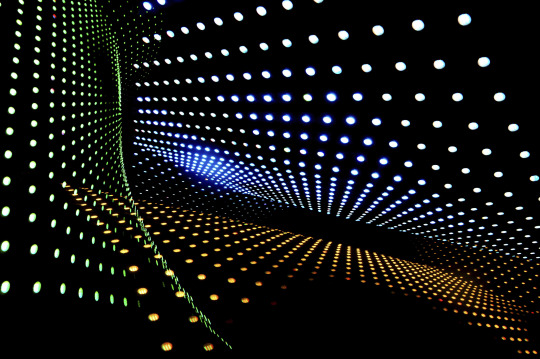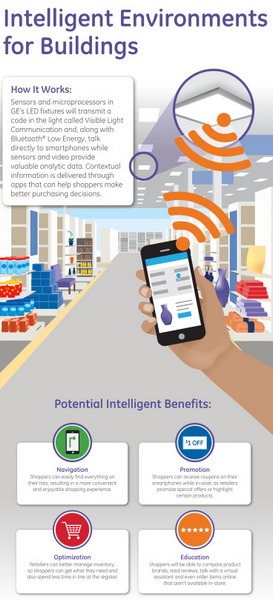 |
|
LED lights. (All photos courtesy of GE) |
Shopping in a big department store can quickly devolve from a simple errand to an odyssey filled with frustration. What section do they put the bath towels in again? Is there a route to take that avoids the chemical attack of the perfume aisle on the way to kitchenware? Where do they put the on-sale jackets?
There are many of us feeling this way. A recent Google survey found that 66 percent of shoppers couldn’t find the information they were looking for, and 43 percent reported leaving a brick-and-mortar store frustrated.
Also, although we arrive armed with smartphones, the in-store experience has mostly been a dumb one. Even the most tech-savvy shoppers can do little more than search websites for information and coupons while standing in the middle of a store. Because GPS doesn’t work indoors, we can’t navigate the aisles without first locating one of those big stationary maps that themselves aren’t all that easy to find.
But GE and Qualcomm Atheros are developing a new “intelligent” technology that’s opening up two-way communication indoors. It turns out that the solution to a real-time customized shopping experience can be turned on with the flick of the switch and fits inside commercial GE LED light bulbs.
 |
|
Illustration: LED matrix |
The system is part of GE’s push into the Industrial Internet. It’s using LEDs that light the aisles of stores to chat with customers’ smartphones while they shop. Sensors inside the LED fixtures emit staccatos of imperceptible light pulse patterns readable by phones or tablets when customers opt in to use a special app.
The technology is called visible light communication. It allows such app-enabled smartphones to talk back to the system using a Bluetooth low-energy channel.
This chatter tells the store system where the customer is located and allows it to beam back to the user’s device information and coupons for nearby products. It also gives customers the ability to navigate the store in real-time. This technology can be also tied to a shopping list, making a trip through a large store faster and more efficient.
Meanwhile, the retailer or store manager can analyze how shoppers move through a location and optimize its display. The system could be also used in airports, hotels, hospitals and other places where users must navigate new and complex surroundings.
“Today’s consumers want a customized experience,” said Jeff Bisberg, the global general manager of GE Lighting’s indoor location project. “From the news they read, to the games they play, to the products they buy, they expect technology-driven personalization. Working with Qualcomm Atheros, we’re harnessing the power of our commercial LED lighting to give retailers the opportunity to create an enhanced experience for shoppers securely, while also respecting their privacy.”
 |
|
GE's smart lighting infograph. |














